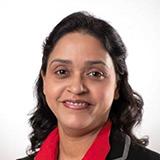Digital Health Bachelors Degree (Honours) - 595
Overview
Program Highlights
- Gain an understanding of information technology (IT) essentials within the field of digital health, including systems analysis, software development, networking, operating systems, user interface design and databases.
- Actively engage in experimenting with digital health devices, such as wearable devices, and use creativity to analyze and visualize data to optimize the delivery of health care.
- Use information technology such as cloud computing and artificial intelligence to improve health care systems.
- Learn programming languages such as JavaScript, Python, C# and PHP, as well as Unity, to create and use mobile health apps, electronic health records (EHRs) and electronic medical records (EMRs).
- Study in our state-of-the-art labs in our mHealth & eHealth Development and Innovation Centre (MEDIC).
- Learn from case studies and presentations based on projects from Mohawk College’s mHealth & eHealth Development & Innovation Centre (MEDIC).
- Benefit from small class sizes in a practical hands-on learning environment while obtaining a degree in the cutting-edge field of digital health.
- Work closely with faculty and industry professionals that have prior experience in the digital health field.
- Collaborate and learn by participating in stimulating industry projects which will allow you to gain valuable research, collaboration and critical thinking skills.
- Apply digital health essentials to the Canadian Healthcare system with a focus on the systems, supports and tools used in the province of Ontario.
- Understand patient safety, personalized health delivery, self-management and behaviour modification.
- Apply research methods and statistics in an applied research project where you will have the chance to work with industry partners and professionals.
What you will learn:
Digital Health Essentials and Technologies
- Develop health information technology solutions such as organizing and protecting patient information (medical history, test results, symptoms, etc.).
- Design digital health systems such as telehealth (a service that provides health advice at-a-distance) and telemedicine (a remote clinical service that provides personalized medicine).
Visual Data Representation
- Create data visualizations, such as charts, infographics, maps and diagrams.
- Use data analytics to help build visual data representations, predictive models of disease transmission and treatment outcomes to inform doctor/patient decision making.
- Learn how to understand and interpret data, with the goal of:
- Making data engaging and easily digestible
- Identifying trends and outliers within a set of data
- Telling a story found within the data
- Supporting a theory or treatment plan highlighting the important parts of a set of data
Digital Health Devices
- Use and monitor wearable devices for real-time health care applications and monitoring, such as:
- Physical activity
- Diet management
- Symptom tracker
- Medical emergencies
- Blood pressure
- Glucose (blood-sugar) level, etc.
- Explore Canadian privacy laws to understand how both patients and medical professionals can securely store and share information gathered from digital health devices.
Mobile Health Apps
- Create database-driven web applications for a healthcare context.
- Learn how to use smart-related body wear, patches, clothes and on-demand drug release.
- Safely store and exchange electronic health records.
Management of healthcare records, systems and processes
- Learn how healthcare devices, products, technologies or systems can securely exchange and use information from one or more sources (Medical Device Interoperability).
- Study cybersecurity processes used to protect patients—both their privacy and their safety.
- Find out more about the organizations and industry standards related to the privacy and security of personal health information and records including:
- Canadian Institute for Health Information (CIHI)
- Personal Health Information Protection Act (PHIPA)
- Personal Information Protection laws
- Electronic Documents Act (PIPEDA)
Digital Health and Sustainability
- Learn how digital health is creating solutions through green technologies to take urgent action to combat climate change and its impacts.
- Implement green cloud computing to provide greater energy efficiency, scalability and elasticity for computing resources.
Digital Health in the province of Ontario
- Gain knowledge surrounding eHealth Ontario, an electronic health record information system.
- Apply your skills through work experience at a healthcare organization such as St. Joseph’s Hospital.
Digital Health and experiential learning
- Complete over 600 hours of practical labs in our state-of-the-art computing, networking, devices and simulation labs.
- Complete one or more work experience with an organization in the field.
- Benefit from our collaboration with Mohawk's MEDIC research centre that specializes in the development of digital health solutions.
Read more about Digital Health at Mohawk
Admission
Admission
Completion of the OSSD (or equivalent) with a minimum of six (6) University (U) or university/college (M) courses:
- Grade 12 English (U-level)
- One Grade 12 Mathematics course (U-level)
- Grade 12 Science (U-level)
- 3 additional high school elective credits (level U or M)
The grade in each of the required courses must be 70% or higher
The average of all six courses required must be 70% or higher
Recommended:
- ICS4U /ICS4C/ICS4M - Computer Science
Language Requirements for Applicants with English as a Second Language:
See below for accepted equivalents for Grade 12 English:
- IELTS Academic: 6.5 (no band below 6.0)
- TOEFL: 83 iBT
- CAEL: 169 (no band below 162)
- CLBT: 8 (no band below 8)
- PTE: 58 (no band below 51)
- GAS-EAP: Successful completion of the GAS-English for Academic Purposes (478 or 278) program
- More information about acceptable certificates, can be found on the International Admission Requirements
- More information about acceptable certificates, can be found on the International Admission Requirements
Tuition and Fees
Tuition and Fees
2024 - 2025 Domestic Tuition and Fees
| Description | Semester 1 | Semester 2 |
|---|---|---|
| Compulsory Ancillary Fees | $881.96 | $785.16 |
| Co-op Fees | N/A | N/A |
| Compulsory Program Fees | $0.00 | $0.00 |
| Domestic Tuition | $3,253.16 | $3,253.16 |
| Total Domestic Charges Per Semester | $4,135.12 | $4,038.32 |
| Total 1st Year Fees | $8,173.44 | |
Above fees based on full-time September program start date. Contact Student Services to confirm fees for other start dates or semesters.
- Full Cost Breakdown
- Explore payment options
- Book costs for your program can be found through the Campus Store
2024 - 2025 International Tuition and Fees
| Description | Semester 1 | Semester 2 |
|---|---|---|
| Total Tuition & Ancillary Fee | $9,055.00 | $9,055.00 |
| Co-op Fees | N/A | N/A |
| Program Compulsory Fees | $0.00 | $0.00 |
| International Tax Recovery | $450.00 | $375.00 |
| Total International Per Semester | $9,505.00 | $9,430.00 |
| Total 1st Year Fees | $18,935.00 | |
If you pay by wire transfer, please note your bank might charge you a fee to transfer money. Make sure your transfer includes the Mohawk payment and the wire transfer fee. This applies to each wire transfer payment you make.
Additional Information
Financial Assistance
Financial Assistance
When it comes to paying for your education, investing in your future can be more affordable than you think. A Mohawk education is one of the most cost-effective means of acquiring the skills and knowledge you need to have a prosperous and rewarding career.
As you start on your chosen career path, it's important to have a realistic set of expectations regarding the expenses associated with attending college. In addition to your tuition fees, you will also need to budget for books, supplies, housing, and other related living expenses. You may be able to supplement your income and savings with scholarships, bursaries, or loans. It pays to do some research into what types of financial assistance you may qualify for.
Available Financial Assistance Resources:
 OSAP Eligible. Learn about Ontario Student Assistance Program - OSAP (domestic students only)
OSAP Eligible. Learn about Ontario Student Assistance Program - OSAP (domestic students only)- Working on Campus
- Additional Sources of Funding
- Financial Assistance Home Page
Apply for Awards:
By submitting a Scholarships and Bursaries Application every semester, students have access to over $3 million in Mohawk College scholarships, bursaries and Ministry-partnered funding to help meet their financial needs.
Financial Literacy:
Whether saving for school, sticking to a budget, or planning for a major purchase, financial literacy affects us all. That's why Mohawk College is dedicated to helping students improve their financial literacy and become more confident in managing their money.
- Complete the free online Money Matters Module to earn Co-Curricular Credit!
- Financial Resources and Calculators
Program of Studies
Course Overview & Descriptions
Click on the course title for a course description.
Experiential Learning
Experiential Learning
- Instructor led labs that will demonstrate the theory.
- Participate in simulation labs where you will utilize the latest digital health devices
- Complete a capstone project that will allow you to demonstrate your skills in Mohawk’s new Digital Health Lab.
- Complete a 420 hour Mandatory Degree Work Experience in the field of digital health.
- Learn from, and collaborate on, projects with our mHealth & eHealth Development and Innovation Centre (MEDIC) group
Mandatory Degree Work Experience
A work experience that includes at least one term in a formal work environment. In most cases the work experience is a paid position that is completed in-between two academic semesters and requires a minimum of 420 hours of work. Students must be in good standing and meet all identified requirements prior to participating in the work experience. The successful completion of the work experience is required for graduation.
Students have the opportunity to complete two work experiences, however, students must complete at least one work experience to graduate.
Work Experience Format | ||
|---|---|---|
| September to December | January to April | May to August |
| Semester 1 | Semester 2 | Vacation |
| Semester 3 | Semester 4 | Work Experience 1 |
| Semester 5 | Semester 6 | Work Experience 2 |
| Semester 7 | Semester 8 | |
Mandatory Work Experience Fees
The mandatory work experience fee can be found on the Tuition and Fees page.
Learning Outcomes
Learning Outcomes
Program Learning Outcomes, often referred to as ‘Program Standards', set out the essential learning that a student must achieve before being deemed ready to graduate.
In many cases these program learning outcomes were developed by the Ministry of Colleges and Universities (MCU) in consultation with employers and educators who are experts in the program field. To ensure the outcomes remain current and in line with industry needs, we invite our employers, graduates working in the field and current students to re-examine and update them during regular, ongoing program review focus groups.
Career Opportunities
Career Opportunities
Your future career options:
- Clinical Systems Analyst
- Information Systems Analyst
- Computer Programmer
- Application Developer
- Data Integrity Analyst
- Database Architect
- Information Privacy Coordinator
- Health Records Technician
- Health Systems Specialist
- Project Manager
- Health IT Consultant
Where you could work
- Consulting
- Hospitals
- Provincial Government & Public Health
- Research Institutions
- Medical Clinics
- Information Technology
- Education
Educational Pathways
Educational Pathways
Pathways to Mohawk
If you've successfully taken a course at another post-secondary institution, you may be able to earn course exemptions toward your credential here at Mohawk.
If you have successfully completed one of the following programs at Mohawk, you may be eligible to receive transfer credit in this program. To start a new program at Mohawk, you must apply via ontariocolleges.ca.
Transfer from
You can transfer to the Digital Health Bachelors Degree (Honours) - 595 from the following programs:
Medical Radiation Sciences
Nursing (BScN)
Computer Systems Technician - Network Systems
Computer Systems Technician - Software Support
Biotechnology - Advanced
Business Administration
Chemical Engineering Technology
Computer Engineering Technician - Mechatronic Systems
Computer Systems Technology - Network Administration and Cybersecurity
Computer Systems Technology - Software Development
Analytics for Business Decision Making
Business Analysis
Digital Health
Receiving Program
Digital Health Bachelors Degree (Honours)
Mohawk College makes every effort to ensure the accuracy of each transfer opportunity. Please note that changes may occur in program offerings, admission requirements, and transfer credits granted by the receiving institutions. We advise all students to check with the receiving institution directly for the most up-to-date information.
Don’t see what you’re looking for? Search ONTransfer.ca for more pathways with Ontario public colleges and universities.
Mohawk College makes no warranty or endorsement of material contained within links to external websites, nor does the College assume any responsibility for the linked website or its contents.
Faculty
Program Coordinator
Faculty
Contact Us
Contact us
Domestic Canadian Students
Contact Student Recruitment
Haven’t applied yet and have questions?
Contact our Student Recruitment team for information on programs, how to apply, and more.
Contact Admissions
Contact our Admissions advisors for help with your application.
Contact Admissions
Phone: 1-844-767-6871
International Students
Contact International Student Recruitment
Contact our International Student Recruitment team for information on programs, how to apply, and student life.
Contact International
Email: intl.representatives@mohawkcollege.ca
Phone: 1-905-575-2254
Toll free phone numbers:
For general questions: 1-888-Mohawk9 (1-888-664-2959)
North China: 10-800-714-2521
South China: 10-800-140-2541
Brazil: 0800-022-7408
Philippines: 180011102544
Contact International Admissions
Contact our Admissions advisors for help with your application.
Contact International Admissions
Phone: 1-905-575-2254
*Not all programs are international eligible. Please see our programs available for international students.
Accessible Learning Services
Are you a student with a confirmed or suspected disability? Visit our Accessible Learning Services website to discover how we can help you.
Program Coordinator
We're here to help
We’re here for you to support applications and admissions by providing online and virtual service.
Applied and have questions?
The admissions team is available to help, you can contact them via Admissions or by phone at 1-844-767-6871.
Haven’t applied and need help?
Contact us or phone 1-844-767-6871.
Take a virtual campus tour
Explore Mohawk College from the comfort of home! Our virtual campus tours provide a guided visit of our buildings, labs, services, classrooms and athletic and recreation centre.
Program delivery
Learn about program delivery terms.
Please note: in-person, virtual, and hybrid classes vary according to the program and some programs may be in-person only. Refer to the Program Overview for more information.











